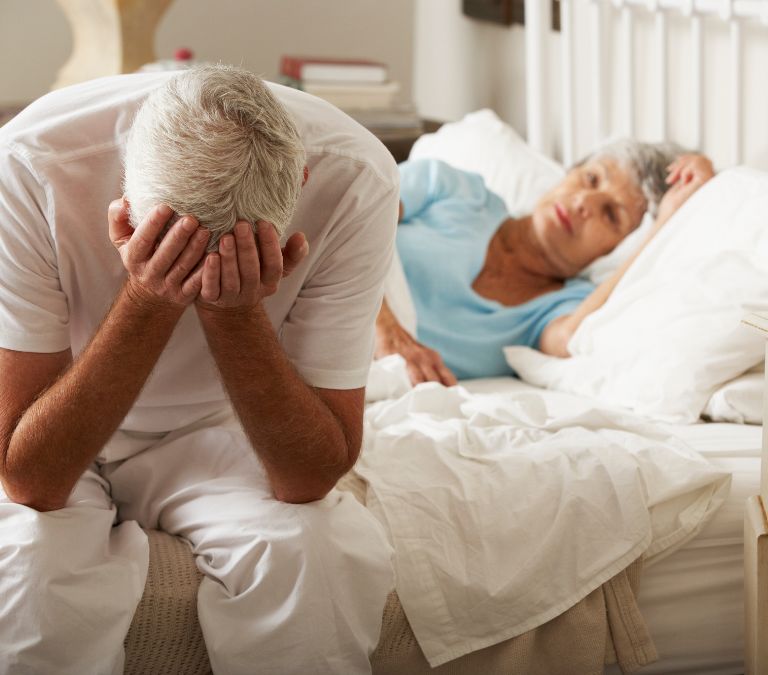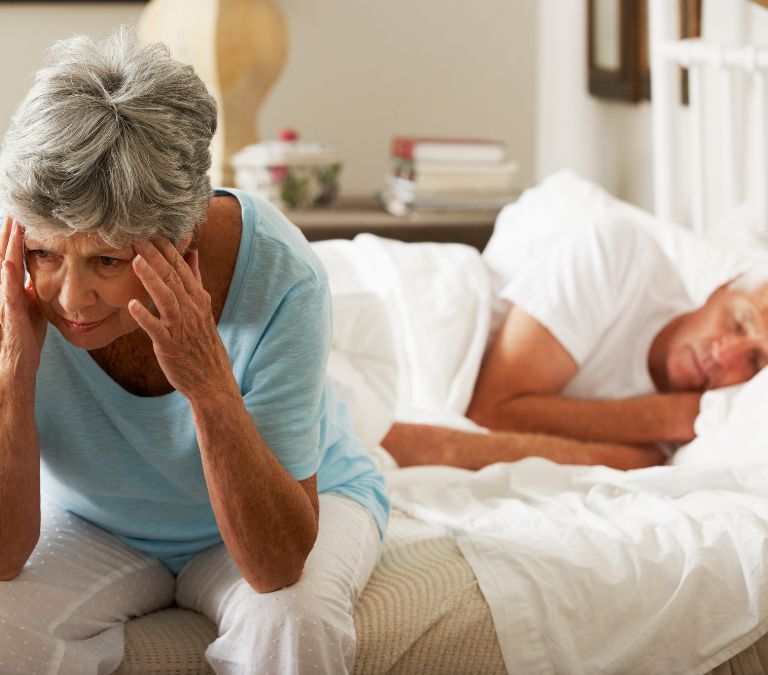Some things are certain in life; love, taxes, death, and of course, menopause. While menopause remains a compulsory phase for every woman who wishes to thrive for many years, its effects on the sex life of these women have made it quite a lethal phase. Menopause causes so many things, from hot flashes to night sweats and, painfully, poor libido.
Understanding Poor Libido
Poor libido means low sex drive. Both men and women are affected by low libido, but women are most affected by it. Generally, a woman’s sex life is characterized by highs and lows. As you age, your sexual desires decline, and the reason for this is not far-fetched.
As women age, they go through significant life phases that cause major changes in the body. The average woman’s body is constantly changing from childhood to puberty, pregnancy to childbirth, and menopause. These changes come with “symptoms” that, in some cases, can be severe. For example, on getting to puberty, periods begin, and each cycle comes with symptoms like irritability and headaches. During pregnancy, symptoms like fatigue, incontinence, nausea, and mood swings, might be experienced.
Low libido can be normal, but when it lasts long, that’s a problem. Low libido causes physical and emotional stress not just because you don’t seem to enjoy sex anymore but because your lack of sexual desire affects your relationship with your partner.
Effects of Low Libido in Relationships
Even with the advancements and innovations in present-day society, sex as a topic is still not discussed, even in relationships. Many women with low libido try hard to improve it without sharing the problem with their partners. When their solutions become ineffective, and they find it difficult to return the advances of their partners, relationship problems become imminent. Many relationship problems today are triggered by sexual failures from one or both parties. The inability to synchronize effectively with your partner in sexual activities can cause more problems than you think.
As stated earlier, a lack of sexual desires can be normal sometimes. After all, you can’t always want sex. You and your partner can’t have equal levels of desire. It is completely normal to have different levels of sexual desire. However, having low libido for a long period can be a massive stressor in your relationship. The statement “maybe later” and “not in the mood” could cause frustrations for the other person, which in most cases could amplify more issues in the relationship. Sex is meant to be enjoyed, but there’s no point when it isn’t.
While intimacy and sexual desires play an integral part in a relationship, it is important to know that several things make a relationship work. Building a good relationship involves effective communication, respect, and honesty. However, minor issues in the bedroom can jeopardize the effectiveness of these three factors.
Menopause and Low Libido
Women produce less sex hormone during menopause. Menopause is the time of every woman’s life when natural pregnancy becomes impossible. Menopause is characterized by ovarian failure. In menopause, the ovaries lose the ability to produce eggs, so there will be no more eggs for fertilization. Also, the ovaries are the main producers of major sex hormones like estrogen, progesterone, and testosterone.
Due to ovarian failure during menopause, these hormones might decline, and this causes the occurrence of symptoms widely referred to as “menopausal symptoms.” Some menopausal symptoms include hot flashes, bloating, osteoporosis, anxiety, sleep distortion, brain fog, vaginal dryness, night sweats, skin dryness, bloating, migraines, and even certain cardiovascular diseases. Menopause doesn’t just cause impairment to the physical life of women; it affects even their mental and emotional health.
Vaginal dryness during menopause can cause painful and discomforting intercourse, leading to a complete loss of interest in sex. This is why a lack of sexual interest is more common in older women. Many women see low libido during menopause as incurable; with this, they take it as it is and live life avoiding intercourse. However, it is important to know that low libido during menopause can be well treated.
Oxytocin and its Role in Sexual Desire during Menopause

Also referred to as the love hormone, oxytocin is a hormone that influences the activities of certain entities of the reproductive system. As a love hormone, oxytocin is closely linked to activities like massage, cuddling, and orgasm during sex. While oxytocin is produced in various body regions, its primary production site is the hypothalamus gland located in the brain.
As estrogen levels decline during menopause, oxytocin levels also decline. Studies have shown that the production of estrogen triggers the production of the oxytocin hormone. This means that the more the levels of estrogen, the more the levels of oxytocin. Studies have also shown that the decline in oxytocin caused by a drop in estrogen levels is closely associated with many menopausal symptoms.
In women, the oxytocin hormone serves different functions. Some of these functions include the initiation of uterine contraction during labor, the stimulation of nerve cells to relieve moodiness, the stimulation of the flow of breast milk, and the termination of postpartum bleeding.
However, recent studies have linked oxytocin as an important hormone influencing sexual pleasure and satisfaction. In both men and women, the stimulation of oxytocin hormone has shown significant changes in boosting sexual function. Studies have shown that oxytocin plays a major role in libido, orgasms, and erection.
Other Causes of Low Libido in Women
Menopause is the main reason for low libido for women. However, certain factors other than menopause can also influence low libido and low sexual drive, even in menopausal women. Here are the most common causes of low libido in women other than menopause:
Medications
Certain medications can influence a lack of sexual desire. Doctors often trace the root cause of low libido to medications capable of affecting hormonal levels in the body. For example, estrogen medications might tamper and reduce the effectiveness of testosterone, a hormone important for promoting sexual desires. Antidepressants like selective serotonin reuptake inhibitors and anti-mania can tamper with libido and reduce sex drive. Due to the effects of these medications on libido, women are advised to research or ask questions about the side effects of medications before using them.
Illnesses
Diseases like cancer, diabetes, arthritis, high blood pressure, and certain neurological conditions can affect the sex drive of both men and women. Some illnesses can make you extremely tired to the point that intercourse and other sexual activities become extra tasking.
Lack of Attraction
Attraction plays a huge role in developing a sexual desire. A lack of a drop in sexual desire can cause a low sex drive. From lack of communication to changes in physical appearance, lack of attraction among partners can be influenced by numerous factors. Studies have proven that most long-lasting marriages have decreased levels of sexual attraction among partners. Studies have also shown that the first five years of most marriages is the peak of sexual attraction, and as the marriage lasts, sexual attraction declines. With aging characteristics now stepping in, the feeling of sexual and physical attraction experienced by most women towards their partners drops.
Hormone Fluctuations
Most cases of low libido in women are caused by fluctuations in the level of certain hormones in the body. Sex hormones like testosterone and estrogen play very important roles in influencing the sexual desires of women. When the levels of these hormones drop, complications are bound to happen. Studies have shown that most symptoms experienced during menstruation, pregnancy, and menopause, are caused by fluctuations in sex hormones, with more symptoms experienced during menopause.
Boosting Libido during Menopause
Low libido during menopause is more common than you think. It has become common that society now sees it as abnormal for menopausal women to engage in sexual activities. While libido in women decreases as they age, menopause doesn’t signify an end to sexual activities. With minor adjustments in your lifestyle and diet options, low libido can be effectively alleviated.
Hormone Therapy
Low libido caused by hormone fluctuations can be well treated with hormone therapy. Hormone therapy is the most common and effective treatment option for menopausal symptoms. Since ovarian failure during menopause leads to the decline of hormones, hormone therapy can help balance the number of hormones in the body by simply injecting more hormones into the body.
Hormone therapy comes in different forms that are effective for certain conditions. Many women with low libido have taken hormone therapy and have recorded a significant boost in their sexual drive. Hormone therapy for low libido can take as long as 6 months before significant results are seen.
One major disadvantage associated with the use of hormone therapy is the risk attached to it. Studies have shown that long-term hormone therapy can cause complications like cardiovascular diseases and certain cancers. Due to the risks involved in hormone therapy, women opt for alternatives that several studies have suggested to be effective enough for low libido.
10 Foods/Supplements That Can Help Boost Libido during Menopause

Certain foods and supplements have been studied to boost sex drive in women. However, the effectiveness of certain food for you might be different from the effectiveness of those same foods in another woman. This is because women react differently to menopause. Studies carried out on the effectiveness of foods and supplements for low libido are still limited, and as such, women are advised to make due consultations with a doctor before adopting any of these foods as a treatment option for low sex drive.
Bananas
Research on the effectiveness of bananas for boosting libido remains unlimited. However, the potassium content of bananas can help synthesize testosterone, a hormone that can help with low libido. Studies have shown that low testosterone in the body can tamper with sex drive by depreciating it. While testosterone is often seen as a male hormone, it is important to know that women also have testosterone.
Amino acid l-arginine
This supplement is believed to possess qualities that can help boost libido in women. Studies have shown that this supplement can facilitate the production of nitric oxide in the body. Nitric oxide can help increase blood flow to the genital by relaxing the blood vessels connected to it.
While this helps men achieve a strong erection, nitric oxide is believed to be effective enough in helping women achieve orgasms. By increasing blood flow to the vagina, nitric oxide can trigger the swelling of the clitoris. With the swelling of the clitoris comes increased sensitivity which can help enhance sexual satisfaction.
Ginkgo
Just like amino acid l-arginine supplements, ginkgo, especially ginkgo Biloba, can help increase blood flow and make the vagina relax and be more sensitive to touch. Many women who have consumed ginkgo have reported a slight increase in their sexual desire.
Omega-3 fatty acids
The role of omega-3 fatty acids in developing and maintaining healthy organs and tissues has been lined as a likely treatment and management option for improving sexual health. Consuming foods and supplements rich in omega-3 fatty acids can improve the brain’s functionality and how the body processes food. Studies have shown that all of these things might, in turn, boost libido and make sex more satisfying. Some foods rich in omega-3 fatty acids include fish like tuna and mackerel, seeds like flaxseeds, and plant oils like soybean and canola oil.
Zinc Supplements
Zinc is important for regulating levels of testosterone. Zinc is even more distinct because it is not specific to reducing or incrementing testosterone levels. Its effects on your testosterone levels depend solely on what you need. If you need to reduce testosterone levels, zinc can help you and vice versa. Low T levels cause many cases of low libido in women. However, consuming zinc supplements can go a long way in helping to increase testosterone levels in the body. Other than supplements, some foods containing a high amount of zinc include pine nuts, crab, red meat, cereal, and lobsters.
Avocados
The link between avocados and libido hasn’t been well established. However, the rich content of vitamin B6 and potassium in avocados make them likely diet options for boosting libido. Potassium and vitamin B6 can help with optimal circulation of blood around the body which, like ginkgo, can help in the improvement of sexual desire and the promotion of great sex life.
Broccoli
Due to broccoli’s high vitamin C content, scientists have suggested that it could effectively boost libido in women. This is because vitamin C facilitates optimal blood circulation around the body. Increased blood flow is important for a healthy sex life because blood flow to the clitoris and pelvic region can increase your sensitivity to arousal during sexual activities.
Ashwagandha
This shrub has been adopted for a long time by both men and women in helping to stimulate sexual desire. Some research on the shrub has suggested that people who use ashwagandha are more likely to experience contentment and utmost satisfaction during sexual activities. Ashwagandha has been used for a long time as traditional medicine and is generally considered to be safe and effective. Before using this shrub as a herbal supplement, it is important to make due consultations with a doctor because ashwagandha supplementation may tamper with the effectiveness of certain medications.
Dark Chocolate
Dark chocolate is sometimes regarded as a natural libido booster. Studies have shown that consuming dark chocolate may facilitate the production of serotonin and dopamine in the brain, hormones known as happy hormones. Serotonin helps with feelings of calm, happiness, and focus, while dopamine helps with feelings of productivity and motivation. Generally, serotonin and dopamine hormones are known as “feel-good” hormones and can help increase the desire for sex.
Dark chocolate also possesses flavonols and antioxidants that facilitate the free flow of blood through the vessels. Free blood flow is important to sexual health because it enhances blood delivery to the vagina, which can help boost libido. However, you must speak to a doctor before taking chocolates as a menopausal woman because studies have shown that consumption of chocolates could trigger the aggravation of menopausal vasomotor symptoms like hot flashes and night sweats.
Watermelon
Watermelon contains high levels of vitamin B5 content, which can help manage stress. Stress is a major contributing factor to low libido in both men and women.
Home Remedies for Low Libido
Some effective home remedies for boosting libido include:
Limit alcohol intake
It is better to take just one glass of wine than two glasses. Limiting your alcohol intake can make you more intimate and more deliberate about returning sexual advances from your partner. Consuming too much alcohol can affect your ability to orgasm.
Get Plenty of Sleep
Exhaustion can lead to low sex drive, and there is no better way to solve exhaustion than getting quality sleep. To help boost your sexual desire, you should regularly take naps while eating and adopt healthy diet options.
Relieve stress
Relieving stress is a good way of boosting your sex drive. Research has shown that women are more vulnerable to sex drive caused by stress. You can relieve stress in your home by using a cold compress or engaging in yoga. These procedures can help you meditate and relieve stress.
An apple a day
Apples can be quite effective in helping with low sex drive. Studies have shown that regular consumption of apples could lead to an increased libido. Including more apples in your diet is advised, especially in your desserts.
Onion and Garlic
Onion and garlic are regarded as good libido enhancers. While studies on the effectiveness of onion and garlic on low libido remain limited, Some women have seen significant improvements in their sex drive after frequent consumption of a mixture of onion juice and ginger juice. Garlic can be chopped, added to milk, and boiled. By doing this, favorable results like increased sex drive can be attained.
Low Libido: Separating the Myths from the Facts

The concept of low libido is plagued by myths and facts that people often mistake one for the other. To ensure clarity and a full understanding of low libido, we have helped separate some popular myths from the facts.
Myth: Low libido is a compulsory part of the aging process
Low libido is often a major part of the aging process. While many women experience low libido as they age, studies have shown that underlying conditions cause most cases of low libido in older women. Only a few women experience low libido caused by natural aging. From hormonal changes to diabetes, cancer, and even low self-esteem, studies have shown that underlying conditions than aging mostly cause low libido.
Fact: You can enjoy sex even with low libido
Sex is satisfying and is meant to be enjoyed. However, low libido leads to low interest in sexual activities. Studies have shown that women with low libido can be aroused quickly. Many women with low libido still enjoy sex; they find pleasure in initiating it. Many cases of low libido don’t mean complete loss of interest in sexual activities. Rather, low libido often leads to less frequent sex. However, you can still enjoy sex as much as you usually do when you are aroused to engage in it.
Myth: Women have a lower sex drive than men
As relatable as it sounds, it is important to know that this statement is false. It is a common assumption that men are always in the mood for sex while women aren’t. Studies haven’t proven this.
Studies have shown that two common elements manifest sexual desire in both men and women; motivation and sexual arousal. Women are believed to have lower sex drive because they go through phases of life, like pregnancy and menopause, that come with complications capable of causing low libido. However, studies have proven that this isn’t a determining factor in concluding that women have a lower sex drive than men.
Fact: Pornography affects sex drive
While porn isn’t perceived as problematic, studies have shown that it can decrease sex drive in both men and women by conforming to the sexual preferences of the individual to the elements depicted in the pornography. This means that women can watch porn regularly and become used to a particular approach portrayed in the pornography to the point that arousal with a different approach from the one depicted in the pornography becomes difficult. However, this can differ for some people. For some women, their sex drive remains unaffected even with frequent watching of pornography.
Conclusion
Low libido caused by menopause is more common than you think. However, several treatment options have been made available to help maintain optimal sex life even during menopause. The fact that you are in menopause doesn’t mean you can no longer enjoy sex.







